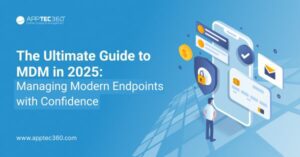In 2025, mobile devices are the new office desks. As remote and hybrid work continues to grow, businesses are increasingly dependent on smartphones, tablets, and laptops to maintain productivity.
With stricter data protection laws and the growing use of BYOD (Bring Your Own Device), IT teams are under pressure to rethink how they manage and secure digital endpoints effectively.
This blog discusses the main challenges in Mobile Device Management (MDM) for 2025. It also provides practical solutions to help businesses remain secure, compliant, and in control of their mobile ecosystem.
Get a free trial of our MDM solution for up to 25 devices and see how easy managing your mobile ecosystem can be.
TL;DR
If you’re an IT decision-maker or security leader navigating mobile device chaos in 2025, especially within industries like retail, healthcare, education, transport, and SMEs, this blog is for you. It’s particularly useful for teams managing BYOD, legacy tech, and growing compliance demands.
Here’s what you’ll learn:
- The top Mobile Device Management (MDM) challenges businesses face in 2025
- How to manage BYOD without violating user privacy or GDPR
- Ways to integrate MDM with legacy systems and support diverse devices
- Why Unified Endpoint Management (UEM) is key to simplifying control
- How to enable real-time MDM alerts and automate compliance enforcement
- What to look for in an MDM solution designed for modern European business needs
Challenge 1: Managing BYOD Without Sacrificing Security or User Trust
The Challenge
More employees are using their personal smartphones, tablets, and laptops. BYOD (Bring Your Own Device) has become common in today’s work environments. While it offers flexibility and saves money, it also raises important privacy and compliance issues.
Organizations must securely manage business data on personal devices. However, doing this without violating employees’ private data is an ongoing challenge. This issue is especially clear under strict data privacy laws like the GDPR. It is crucial to carefully balance the need for oversight with the need for privacy.
Without a clear separation between corporate and personal environments, businesses risk data leaks, reduced employee trust, and non-compliance with mobile privacy regulations.
The Solution
- To address these risks, businesses are encouraged to use Mobile Device Management (MDM) solutions that emphasize privacy.
- Container-based MDM tools like AppTec360 and SecurePIM allow IT teams to isolate and manage work-related data without interfering with personal content on the device. This ensures that only corporate data is controlled while personal information stays secure.
- In addition, implementing clear, transparent usage policies is essential. Employees need to know what is monitored, why it matters, and how their personal data is protected. Being transparent helps with acceptance and lowers resistance.
- Prioritizing GDPR mobile compliance is key. MDM solutions must allow for local data storage, use opt-in consent mechanisms, and keep detailed access logs to meet data protection standards.
- By integrating privacy-focused tools with strong communication strategies, organizations can effectively manage BYOD while maintaining trust and compliance.
Challenge 2: Fragmented Device Ecosystems and Legacy Tech Integration
The Challenge
Managing a diverse range of devices, such as iOS and Android smartphones, Windows laptops, rugged devices, and even IoT endpoints, has become a significant challenge for IT teams. Today, most businesses work in environments with many different devices, often driven by various departments and remote workflows.
Many organizations still rely on legacy systems that were never meant to work with modern Mobile Device Management (MDM) platforms.
The fragmented nature of this setup leads to tool-switching, visibility issues, inconsistent policy application, and lower operational efficiency. As a result, IT teams often spend more time managing the tools than the devices themselves. These MDM challenges typically increase as the variety of device types expands, and user expectations for seamless access rise.
The Solution
- The best way to tackle the challenges of device diversity is to use Unified Endpoint Management (UEM) platforms that support a wide variety of operating systems and device types.
- UEM solutions are built to provide centralized control in a decentralized environment. This helps reduce complexity and increase scalability.
- When choosing a solution, look for MDM platforms that provide solid legacy system integration through APIs or built-in connectors. This keeps older systems working without interrupting device management.
- The features of zero-touch enrollment can improve the onboarding process, especially when used across different or large fleets. By cutting down on the need for manual setup and configuration, IT teams can reduce errors and create consistent policies from the start.
- By combining wide compatibility, support for legacy systems, and automation, businesses can turn fragmented ecosystems into a single, manageable environment. This helps them stay ahead of future MDM challenges.
Challenge 3: Keeping Up with Real-Time Compliance and Threat Detection
The Challenge
Mobile endpoints are crucial for everyday business operations, but they are also some of the most vulnerable parts of the IT ecosystem. As regulations like GDPR, NIS2, and the ePrivacy Directive evolve, meeting compliance is a constant challenge. This is especially true for small to medium-sized organizations, which often do not have the tools needed for real-time monitoring and response.
Delayed operating system patches, unapproved applications, and configuration drifting create security weaknesses. Without timely alerts or visibility into mobile activities, IT teams struggle to enforce policies before risks turn into breaches.
This lack of proactive control is one of the biggest challenges in Mobile Device Management (MDM) for businesses that want to meet regulations and keep a secure position in fast-changing environments.
The Solution
- To close these gaps, organizations need to use MDM solutions that have real-time compliance monitoring and built-in risk alerts.
- These platforms constantly check device status, point out non-compliant activities, and enable IT teams to act right away. They can lock a device, perform a remote wipe, or limit access to company systems.
- Automated enforcement mechanisms are important. By setting predetermined actions for specific compliance violations, companies can reduce response times and prevent potential harm without relying on manual supervision.
- For a stronger security framework, MDM platforms must integrate with established SIEM or SOC tools, which enables centralized threat detection and incident response. This not only improves mobile threat detection but also ensures that mobile device activities are in line with broader IT security strategies.
- With the right tools in place, businesses can stay ahead of both compliance updates and emerging threats, protecting their mobile infrastructure without slowing down operations.
Industry-Focused Challenges and How AppTec Solves Them
- Retail: Managing different devices in stores and among staff can be challenging. AppTec’s privacy-first MDM and real-time compliance tools ensure secure transactions and effective device control in busy retail settings.
- Healthcare: Strict regulations and sensitive patient data require strict compliance. AppTec’s GDPR-aligned mobile management and risk alert systems assist healthcare providers in protecting data and meeting regulatory standards easily.
- Education: Schools deal with BYOD policies, old technology, and limited IT resources. AppTec’s containerized solutions and automated device onboarding make it easier to manage student and staff devices securely while protecting their privacy.
- Transport & Logistics: The wide variety of devices, including rugged handhelds and IoT sensors, creates integration challenges. AppTec’s Unified Endpoint Management (UEM) platform and legacy system connectors simplify device control across complex fleets.
- Hybrid Work Environments & SMEs: Remote access and data security are crucial, especially with different devices. AppTec provides scalable MDM solutions with zero-touch enrollment and centralized control. This helps teams remain productive and compliant no matter where they work.
Wrapping Up: Choose an MDM That’s Future-Ready
In 2025, effective Mobile Device Management (MDM) means more than just controlling devices. It’s about balancing BYOD privacy, integrating with different systems, and ensuring real-time compliance. Businesses need MDM solutions built for the region, supporting local data hosting, multilingual policies, and strict privacy rules.
When evaluating MDMs, prioritize security, compliance, and simplicity, not just device control.
Looking for a customized solution? Explore our MDM services or contact our team to discuss how we can help secure your mobile environment in line with modern challenges.



